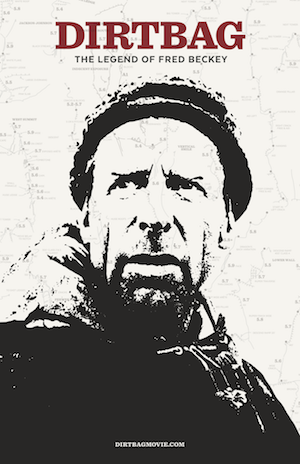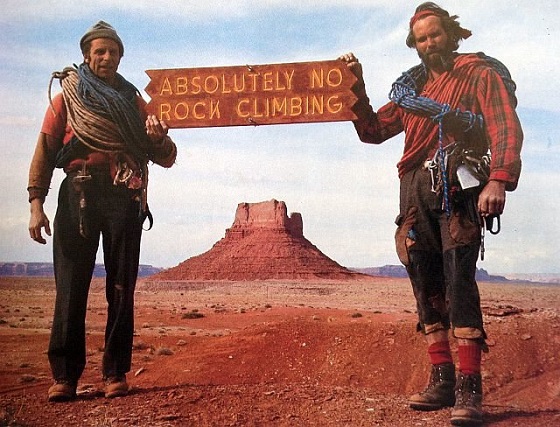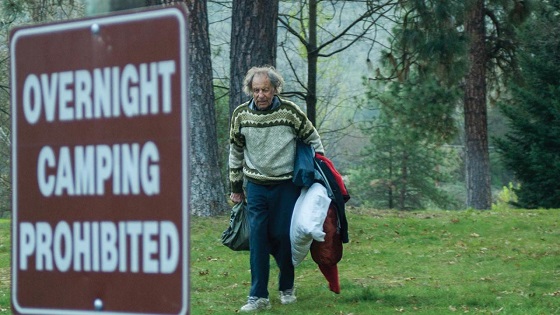There’s something endearing about a person committed to a singular purpose or vision. For many people, it takes discipline, focus, and resiliency to master a craft, yet for a select few, an all-consuming obsession fills that void. It’s not that this latter group lacks the commitment of the former, etc., it’s just that they know and want nothing else, and thus don’t have to battle distraction, despair, or the like.
Climbing legend Fred Beckey is just such a man, for in his 70-plus-year career as an alpine mountaineer, he has dedicated his entire body and soul to his craft and left little room for anything else.
Dirtbag: The Legend of Fred Beckey is the story of the eponymous climbing legend, Beckey, who has been making history and inspiring climbers since the late 1930s. Director Dave O’Leske opens his documentary with a series of saved voicemails from Beckey, whose scratchy, weather-worn voice speaks to more than seven decades spent as a pioneer of the mountaineering community. No climber has ever come close to the number of first-ascent climbs Beckey is credited with, and in terms of sheer volume, he may be the most experienced mountaineer in history. Yet these distinctions have come at a price, for Beckey systematically cut out anything and anyone who got in the way of his pursuit of the next challenge, and while this has made him a legend, it has also put him on something of an island.
As Dirtbag winds its way through Beckey’s early days as an up-and-coming climber, it peppers in testimonials from colleagues, former partners, and notable admirers who all speak with a mix of reverence, awe, and incredulity. Since young adulthood, Beckey rarely worked a traditional job, lived out of his car for years at a time, and generally lived a hobo-esque, beatnik sort of lifestyle that revolved around the constant pursuit of the next climbing challenge. While his contemporaries have spun their climbing accomplishments off into business opportunities and endorsement deals, Beckey has been busy sleeping in parks, exploiting free refill policies, and spending what money he does have on gas and climbing provisions.
Yet Beckey isn’t just a climber, he is also a prolific writer, and has penned several books on North American climbing, drawing on decades worth of personal notes and dogged research. What comes into focus as the documentary winds down is a man whose entire life has been dedicated to the pursuit of climbing, a pursuit that Beckey isn’t ready to abandon even in his mid-80s. Indeed, although the documentary draws on photos and home movies dating back to the mid-20th century, Dirtbag keeps coming back to 2009, when the 86-year-old Beckey is attempting to knock out four peaks he’s wanted to ascend for some time.
And while it is inspiring to watch a man at that age pursuing his life’s passion, it is also a sad testament to an unmoored life with just the one anchor. Yes, Beckey climbs because he loves the tranquil beauty of the outdoors and the thrill of a summit pursuit, but he’s also out there because he literally has nothing else. His entire adult life has centered around climbing, and has left nothing else for the man to enjoy in his twilight years. In many ways, Beckey’s life is similar to a painter like Van Gough, the Japanese swordsman Musashi, or the conservationist John Muir. All of these men pursued their crafts with a singular purpose, and while the fruits of their labors may have come in varying degrees during their lives, the true measure of their accomplishments were only appreciated after they were gone.
Dirtbag makes it seem like a lonely existence; to devote everything to the study of a craft, to eschew all other connections or relationships: this makes for one hell of a legacy, yet the life itself appears somewhat one-dimensional. Dirtbag touches on the fact that there were moments when Beckey could have cashed in on his accomplishments, or committed to a more stable, family-based lifestyle, yet circumstances or outright avoidance kept the man on a solitary track. Only time will tell if Beckey will be as highly regarded in his field as Van Gogh, Musashi, or Muir, yet for his own part, the legendary climber seems to have few regrets save for the fact that he’s gotten older.
And really, that’s the rub. O’Leske’s documentary is refreshing in its honesty, and commendable for its refusal to take a side in the debate about whether Beckey’s life-choices were the “correct” ones. By turns, the documentary see-saws back and forth between an admiration for the man’s accomplishments, and sympathy for the loneliness he wallows in. More than a passion, mountaineering is the only thing Beckey knows, and for a guy pushing 90 at the time of filming, there’s a sadness to this single-minded pursuit of his hobby: much like a Rockstar still trying to get their band off the ground at that age. More than just an exploration of Beckey’s climbing legacy, Dirtbag is an examination of what total commitment to something does to a person, and whether the spoils justify the grind.
Now playing at the Seattle International Film Festival, Dirtbag: The Legend of Fred Beckey is a fascinating exploration of passion, triumph, failure, commitment, and legacy. It shows what’s possible when a person gives everything to a pursuit, and what remains after the dust of a lifetime of accomplishments settles. The documentary celebrates what a single-minded commitment to one’s craft can attain, yet finds time to question if it’s all worth it.









Comments on this entry are closed.